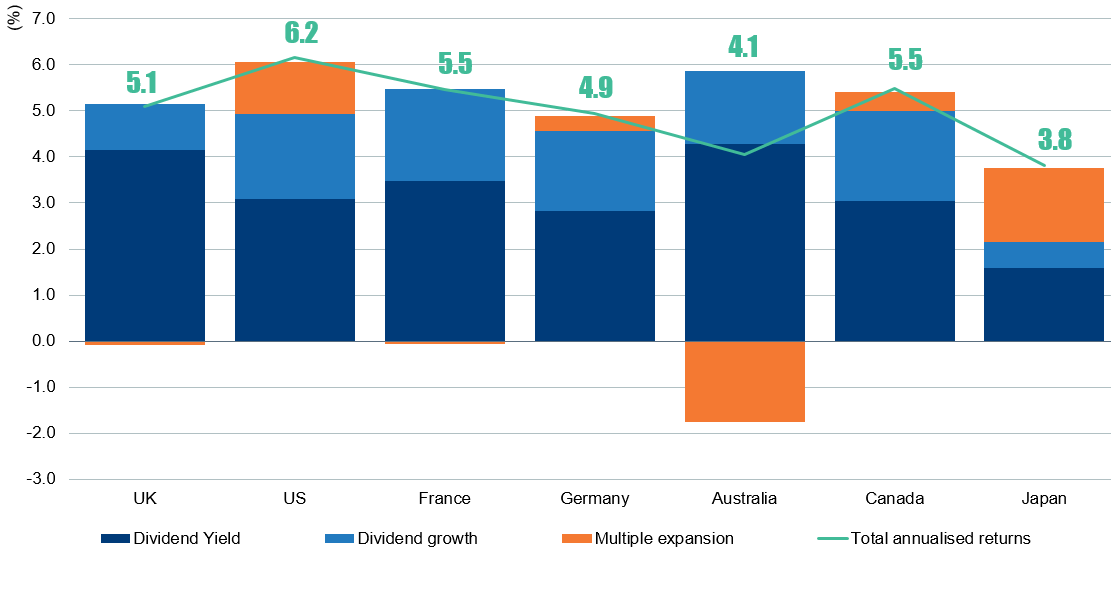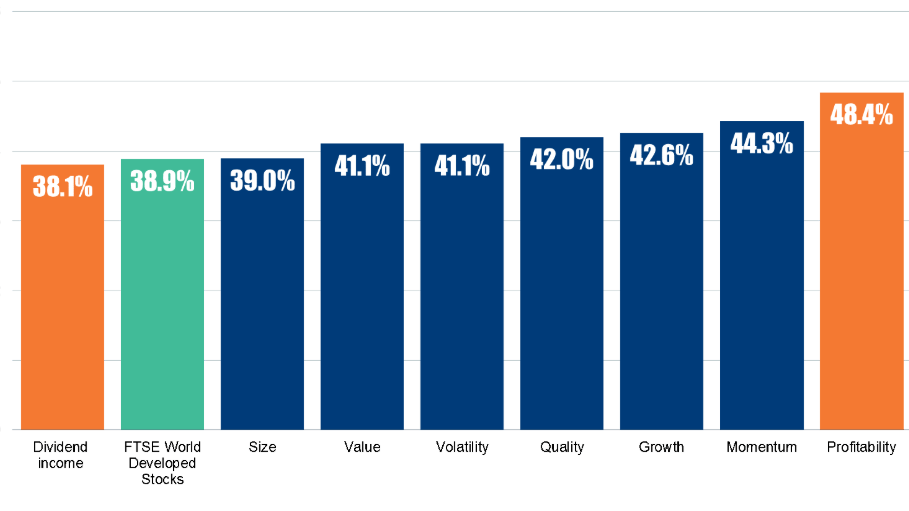Over the last three years, global equity markets have broadly continued their upward trajectory, regardless of the growing macroeconomic and political headwinds. This ability to shrug off (or simply ignore) the potential obstacles has meant that, up until recently, equity markets as a whole have continued to do well against a backdrop of low volatility.
In this environment, it is therefore perhaps unsurprising that profitability (gross profit over assets) and momentum strategies have been the standout performers from the different styles of global equity investing over the last three years to 31 August, while dividend income has been the poorest performing style. The chart below shows that momentum strategies produced a 44.3% total return over the time frame and profitability strategies did best with a return of 48.4%, comfortably outstripping the FTSE World Developed Stocks index return of 38.9%. Meanwhile, dividend income was the only investment style with an inferior return to the index over the three years to the end of August 2018 (38.1%).
Global equity investment styles: total return over three years to 31 August 2018*
Source: SG Cross Asset Research/Equity Quant, FactSet, FTSE, 10 September 2018
*All returns are total returns on a local currency basis. Performance derived from the top quintile of stocks by each style assuming monthly rebalancing.
The strong retail flows into global equities over the last 12 months are indicative of how momentum investing has caught the imagination, fuelled by markets which continued to rise despite the spectre of the unwinding of central bank monetary policy, onerous debt levels and rising geopolitical risks. The Investment Association calculated that almost £7 billion of retail money flowed into global equities over the 12 months to 30 June 2018. However, over the second quarter of 2018, as volatility returned to markets after a period of relative calm, this had slowed sharply to just £190 million, and has been broadly flat since.[1]
The return of volatility since January 2018 has been exacerbated by concerns over global trade wars, and, in our view, investors’ mindsets are beginning to shift away from the ‘goldilocks’ markets of the last three years to refocus more on ‘end-of-cycle’ considerations. We believe attention is switching back towards global equity income at a time when more defensive stocks have been better supported by recent flows, and as investors refocus on the prospect of a more secure and stable dividend stream in more volatile markets.
Reversion to the mean?
We believe this recent support for more defensive companies with sustainable cash flows is happening because investors are starting to remind themselves of what has worked over the long term, rather than simply focusing on the recent underperformance of dividend income in the last three years. As the chart below shows, over almost five decades, dividend yield, and the compounding effects of dividend growth, have provided the largest proportion of equity returns across all seven of the biggest investment markets listed in the chart.
The dominance of dividend income real return over the long term (1970 – Q2 2018)
 For illustrative purposes only. Source: Thomson Reuters Datastream, total annualised real return in local currency, 30 June 2018.
For illustrative purposes only. Source: Thomson Reuters Datastream, total annualised real return in local currency, 30 June 2018.
We believe that after three years of short-term underperformance, and with global equity markets turning more volatile, global equity income may be well placed to reassert its long-term outperformance credentials as a reversion to the mean begins to take place.
[1] Source: Newton, August 2018
This is a financial promotion. Any reference to a specific security, country or sector should not be construed as a recommendation to buy or sell investments in those countries or sectors.







Comments